|
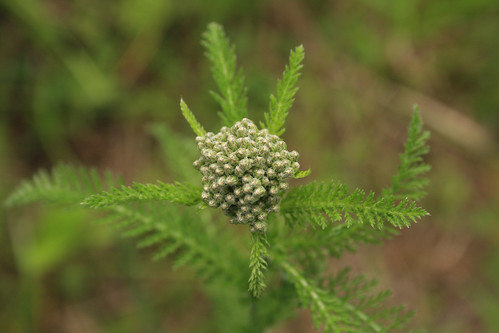
Buds of the yarrow, Achillea millefolium.
(*photo credit)
May 1, 2014 A Patriot's Prayer
Lord, Today is our National Prayer Day,
but You expect that we should pray every day,
so what makes this really so different?
Is it because we have to pray together at times,
even when we pray differently, worship
in our own way, speak in different words?
We may not look east, bow, bend a knee, move our lips,
stretch out our hands, or fold our hands.
But at times we need to pray together.
A patriot who loves his land must pray.
Jesus weeps over Jerusalem; we weep for America.
If we but knew the things that are to come.
Patriotism means we love and support our country --
not when right or wrong, but only when right,
and strive to make it right again.
We are to show the world our love,
not flaunt our military might and power,
but be people of a sincere and humble heart.
Perhaps a false manifest destiny of the past
was our expression of immaturity
with streaks of goodness intertwined.
We do not want other nations hurt in any way,
we wish them prosperous futures
and a higher quality destiny for their people.
For we simply cannot police the world;
such is the goal of an evil spirit
and deserves to be understood and denied.
Lord, give us a humble and contrite heart,
make us a people who can find the right approach,
to refrain from violence even when attacked.
Teach us to give and not to count the cost,
to serve a needy world with open arms
like natives received our ancestors.
Make us mindful of future generations,
for those who need what we regard as luxury,
and teach us to use all things in moderation.
Give us the strength to come together,
not checking if others bow or fold their hands,
but united with a clean and humble heart,
One not proud or boastful or feeling superior,
or set in a self-righteousness of the past.
But only give us an open and clean heart.
Help us see what is right and what is wrong,
to choose the former in a national way,
and do it now, and do it well.
Amen.
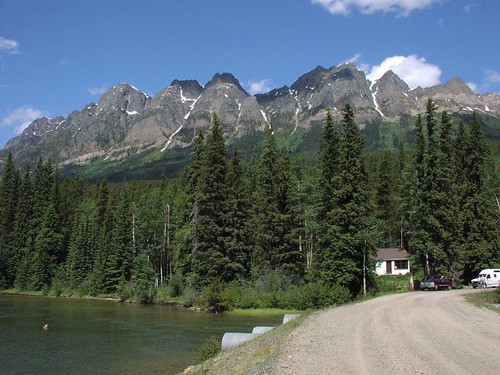
Scenic landscape in path of Keystone XL Pipeline.
(*photo credit)
May 2, 2014 Why We Must Stop the Keystone XL Pipeline
Many words are spoken in the long and bitter controversy over a section of the pipeline meant to bring tar sands oil from Alberta Province in Canada to the U.S. Gulf Coast. This is not small talk, for it could equal about 750,000 barrels a day from one of three largest potential oil fields in the world (plus 100,000 barrels of fracked oil from North Dakota). The U.S. State Department issued its final supplemental Environmental Impact Statement in late January after a draft in 2013 -- and this weighty document admits that the project's total direct and indirect emissions would contribute to cumulative global greenhouse gas (GHG) emissions, but that it is unlikely to significantly affect the rate of extraction in oil sands areas. The governmental decision being awaited must consider the following published facts by Ryan Koronowski of Climateprogress:
1. Rails now used for transporting the oil are an expensive way and so the pipeline is the only profitable way to go;
2. Whatever way the material is shipped it is dangerous as we recall that as of February, over the past 37 years there have been 28,666 crude oil spills (and 47 died last year at Lac Megantic, Quebec from an oil train derailment);
3. These tar sands crude are the dirtiest on the planet. Besides what is burned, the energy it takes to get it out of the ground along with the residue of "petcoke" must be somehow disposed. When burned, the emissions from a single year of crude petroleum sent via the pipeline would equal 51 coal plants.
4. This is not something FOR the U.S., since oil products may be sent elsewhere and most likely is an option for the shippers if U.S. oil exports are permitted in years to come;
5. The potential for spills from oil pipelines are so great that currently one area near where the pipeline is to be laid have "a neighborhood watch" on existing conduits;
6. The pipeline will cause prices to rise, according to Consumer Watchdog, due to the complex economics of the shipping and purchases of petroleum products; and
7. The pipeline will have permanent impacts on the wildlife in this region as well as potential damage to the Ogallala Aquifer, which supplies 83% of Nebraska's irrigation water.
* However, the major reason for blocking this Keystone XL Pipeline are not these telling facts but the locking of us into the carbon-fuel economy that could exacerbate climate change damage to our planet. We must curb this process before it is too late.
Prayer: Lord, help us see the imminent dangers of not halting this pipeline that would lock us into gravely harmful actions.
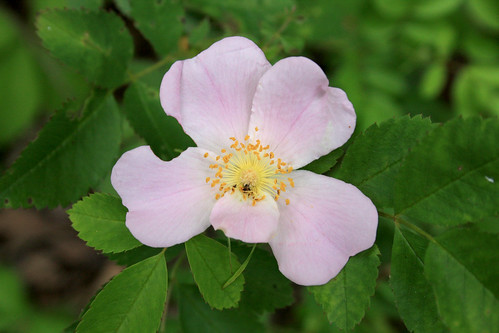
Native Kentucky "rambling rose," Rosa setigera.
(*photo credit)
May 3, 2014 May Flowers and Derby Day
The first Saturday in May is Derby Day and a major Kentucky event of fashion and racing. On this day the "Run for the Roses" at Churchill Downs in Louisville starts the first leg of a triple crown in racing. The highly celebrated winners (thoroughbred horse and jockey) are adorned with garlands of roses. Our flowers of May delight all in the northern temperate zone. Flowers galore! For two years we have begun each month's reflection by a seasonal flower along with a simple verse and photos, generally from Janet Powell's extensive collection.
Flowers are a natural complement to a broad variety of environmental issues; they set a tone during times of distress; their obvious beauty gives us a sense that the future will be better. Flowers open our souls to search horizons for both hope and courage to preserve the best of the past. We realize that spring wildflowers flourish for such a short while before the spreading tree foliage bids them adieu for another year. Let's appreciate fleeting beauty and make the best and enjoy God's floral gifts, for our time is short. Both tame and cultivated flowers speak to us and teach us that we can reclaim a damaged world. They are a universal symbol of love and affection.
Flowers are integral to Earthhealing and remind us that we need constant encouragement in the difficult work ahead. Flowers, wild and tame, mellow our bellicose nature while energizing us for more peace-loving but still radical action. As freshly cut, flowers sacrifice themselves to brighten special situations. "Say it through flowers," florists proclaim: bouquets for the newly-wed, corsages for the party host, decorations for the banquet, prizes for the best at the conference, tokens for departure, adornments at the altar, wreathes on the casket, and reminders at graves.
Where strategically located, cultivated flowers drive away pests and increase the economic value of property. But utilitarian factors are not the only reason for promoting flowers. They satisfy all the senses: their color attracts us as well as bees and other pollinators who add sound to the floral surroundings; their smell is also attractive, for we often want to just enjoy the fragrance; their petals have a special feeling; and some even taste good (e.g., violets, some lilies and nasturtiums) when used to garnish salads, especially during this Salad Month.
Being in an extended family of flower lovers is a blessing. When visiting Germany and France, we find graveyards filled with planted flowers; during summer and fall, window boxes are abundant. My now deceased cousin Marthe last summer pointed to her window box in Alsace and said "geraniums." That family fondness for flowers crossed the ocean and is expressed in our flower plots that define home as a place of return and rest. Flowers speak to earthly places but also point to a heavenly one as well.
Prayer: Lord, thanks for revealing yourself through flowers.
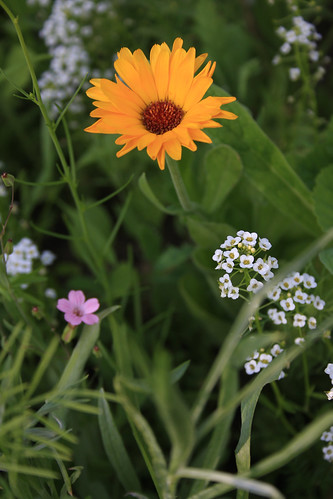
Spring flower garden with fresh blossoms.
(*photo credit)
May 4, 2014 Scripture and Fulfillment
'This is what I meant when I said, while I was still with you that everything written about me in the Law of Moses, in the Prophets and in the Psalms, has to be fulfilled.' (Luke 24: 44)
We continue the Easter story in today's reflections with the narrative of the Emmaus journey in St. Luke's Gospel. We see that the Scriptures indicated the manner in which the Christ was to come, live, suffer, and die for us all. We could conclude that the words written in previous times were now coming to pass, a wonderful fulfillment of an ancient promise. However, so many at the time of Christ expected the Messiah to be a political leader, paving the way for a glorious state, independent of pagan Rome and shining before the entire world. Weren't these the expectations of Jesus' disciples even at the time of his Ascension? Only after Pentecost was the humbling sacrificial ministry in the manner of suffering servant more fully understood.
The reading of Scriptures has been a component of the Sunday Liturgy since the first Last Supper and very early Christian celebrations. The communities of believers read from both Old Testament readings and the letters or Epistles and Gospels of early New Testament leaders in wider circulation. We reverence the Holy Book and carry it in solemn procession, incensing it and holding it high as God's word. We continue the Jewish community's reverence of Torah (the Old Testament's first five books).
Fulfillment now takes on a new and fuller meaning for us. We are more than passive observers of a fulfilled event; we are active participants in a fulfilling opportunity. As people who carry the Good News to others, we seek to fill and satisfy the hearts of many who burn for the Word of God. We are the ones called to become other christs, and we take on a proper messianic role of bringing salvation through our physical presence and actions. We play a role in fulfilling, for we make full the suffering of the Lord. At Easter we help lift the believing community's consciousness; Jesus is risen, has gone ahead of us, and beckons us to follow in his footsteps.
We are the fulfilling word of God in various ways: Scripture can be a basis for our study and meditation. When we read passages, we need not cover much territory, but rather follow where the Spirit leads within the season, so that we live the Paschal Mystery. Reading from one or other unrelated passages has some fruit, but thinking and celebrating with the body of believers in the Church allows us to be in tune with the season; and Easter is a season of great joy. Furthermore, we are to take Scripture to others, encouraging them to read and reflect on the Word of God, and helping them make Scripture part of their own prayer life. Then many more hearts will burn with Easter joy.
Prayer: Lord, teach us to pray the Scriptures and to show in our actions that we truly believe it is your sacred word.

Five petals to celebrate Cinco de Mayo.
(*photo credit)
May 5, 2014 Recognize Cinco de Mayo
Mexico is closely connected to the U.S. in more ways than just a long common border. Connections include millions of Mexican Americans who make our country verge on becoming bilingual and that is for the better of all; we all need to be proficient in two of the major languages of the world. Togetherness is better served when we can celebrate together -- and all people, rich and poor, working and retired, young and old, have reasons to celebrate. In doing so we create bonds of fellowship and cooperation making us one people. This day is worthy of continent-wide celebration for it is very important for creating a stronger partnership with neighbors on every side. On the 5th of May, Mexicans celebrate the defeat of the French army at the battle of Puebla in 1862 -- fortunately, eight years before my grandfather entered the French army. Let's not confuse this important Mexican holiday with their Independence Day, but it is their occasion for celebration.
While we are encouraged to celebrate together, we do have work to do to bring us closer. We wince that our country has criminalized the act of returning after deportation to visit family left behind in the U.S. Our immigrations regulations are a true mess, and that is not worth celebrating. For years since the first election of President Obama in 2008, new migration legislation has been proposed and postponed over and over. We are now nearer through a piecemeal process of securing borders and allowing more of eleven million of the undocumented to stay and enter the pathway to citizenship. On their part it is non-criminal to desire to come North for a decent job. A guest worker program could help fill the need for farm workers to harvest our needed food crops. Why fault those who want to work and who are very proficient at their jobs?
Some will say Mexico is retaking its former territory (Texas, California, Arizona, New Mexico and Nevada) in a non-violent manner -- of immigrant entry, hard work at menial positions, and a dependable family orientation that is actually welcomed by many communities (check out our Ethnic Atlas maps at brassicabooks.com). The rapid increase to one-quarter Hispanic in the total ethnic composition in these states is not to be overlooked. The birth rate among the Hispanic population exceeds that of the Anglo population and challenges that of other races as well. Hispanics see the future as theirs, and that may prove a welcome relief for a country that needs dreams of destiny as held by our ancestors at times of arrival. Let's treat hard-working folks with respect.
Why celebrate a feast of one national group over others? We celebrate St. Patrick's Day, Columbus Day, and Martin Luther King's birthday, though in different ways. Cinco de Mayo deserves some sort of recognition as a sign that we appreciate the contribution that Mexican-Americans make in the U.S. No one deserves this mutual respect and good wishes more than our Mexican neighbors.
Prayer: Lord, help us be good neighbors through mutual celebration.
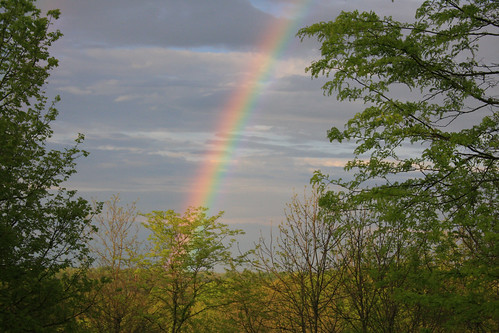
Early spring rainbow in Kentucky.
(*photo credit)
May 6, 2014 The Rainbow: God's Covenant with Our Earth
God said, 'Here is the sign of the covenant I make between Myself and you and every living creature with you for all generations: I set my bow in the clouds and it shall be a sign of the covenant between Me and Earth. (Genesis 9:12-13)
This is Astronomy Day when, if the weather is clear, we spend a little extra time looking heavenwards during our busy life. In this month when the unexpected sprinkles come on the warming days, we should be extra aware that rainbows can come right after the falling shower when a mixture of moisture and sunlight can allow awesome rainbows to appear. Whether a moment of reflection on clear starlit nights or those momentary rare rainbow occurrences during daylight, we ought to be a little more alert to God's gifts all around us.
Natural phenomenon reveal vivid colors. We look down at a dewdrop on a sunny spring morning and we see sapphire, emerald, ruby, or topaz, depending at what angle we look. This is one marvel that shows the dispersal of light into its various colors. Look at an oil patch in the sunlight and see the variation of light rays as well.
Observe rainbows with a clean heart. The sacred writer begins the passage in the Genesis 9:8-15 account by "see." We only observe God's creation by taking a moment to gaze and reflect, and then in an instant praise God in the midst of creation's beauty together will all creation. In all likelihood, we may be the only spectators praising God for this beautiful and temporary marvel of varied colors in a busy world, when others have a multitude of concerns that fill their mind.
The Noahic Covenant is present today. The covenant between God and all living beings (including us within the family of creation) is recalled with each rainbow, an ancient agreement sealed by God's word. This is the living world about us, whether a fetus in the womb, a coyote pup, or a struggling flower in the crannied wall. Each seeks the glory of life in its own form and we are especially privileged to thank God for these and all struggling forms of life. By giving a moment of respect, our good will becomes contagious and spreads with a planetary rippling effect.
Let's not avoid positive actions. People often tend to run away from an accident rather than to help. The Earth is presently hurt by the accident of overuse and harmful misuse of resources. We are called to be Good Samaritans, creatures of the Noahic Covenant, people of the New Covenant. If Earth is threatened by climate change, we are called as Easter people to address the issues and help modify the situation. We cannot deny what is happening, excuse ourselves from what needs to be done, or escape to other allurements. Rather, we are to affirm the current state of affairs, accept our joint responsibilities, and enter the fray. Let's become rainbows to others: observe, follow, and act as one.
Prayer: Lord, thank you for the rainbow and the opportunity to make this natural symbol appreciated by others.

Black rat snake, Elaphe obsoleta, free after being caught in debris pile.
(*photo credit)
May 7, 2014 Spring Litter Cleanup is Necessary
During National River Cleanup Week we consider the health of our rivers and the unhealthy treatment of landscape along with waterways. Yes, cleaning demands tackling litter, trash, garbage, and throwaway problems. This is the negative side of consumer culture because so much is made discardable after a single use and there is little mechanism and space to handle these disposable materials in a green and productive manner. In Kentucky and elsewhere we have a $500 fine for littering, and no one wants to pay such a bill.
A clean countryside is a resource for potential tourists and sightseers who come to enjoy the natural beauty. An unlittered landscape is worth more in sightseeing and monetary potential. The littering is also a problem in other parts of the world as they enter the disposable consumer culture. Litter has the potential of destroying our livelihood. Let's not be tempted to bring in volunteers from outside the region to assist in something that ought to be done by local citizens. It is our people's carelessness along with our failure to enforce anti-litter regulations.
Volunteers loose enthusiasm when feeling that they are simply perpetuating a sorry state of affairs. Address the consumer culture with its tendency to allow disposals that make profiteers ignore returnable containers and expect society to do the dirty cleanup work. One method that does work in Kentucky is having those arrested for non-violent offenses spend time in community service in work release; it's better than the expensive alternative of spending time in jail. No one really likes doing such lowly tasks but someone must do so, especially those arrested for littering in the first place.
One answer is quite reasonable. Let's clean up a little each day and begin today. The problem involves more than rivers and includes our roadsides, parks, playgrounds, and our own yards. Just reach down and pick up a little when out on a walk or run. If need be, take a small garbage bag along. I would never have said this a while back, but we know cleanup starts with us. If it generates a little anger within us, we may be influenced to report a culprit or pressure enforcement of our existing regulations. We may even challenge others who toss the soft drink can out the window. If others see us pick up litter, they may do the same and get incensed by the messy condition all around us.
Perhaps patience is needed, but it's not the only thing. Report litterers by taking license numbers -- but don't attempt actual enforcement. Continue to fight for a deposit tax on containers (10 cents a bottle) and for corporate responsibility to take back and reuse returnables. For enhanced civic pride let's get rid of litter and do our part in the cleanup.
Prayer: Lord, give us patience but be strict with litterers.
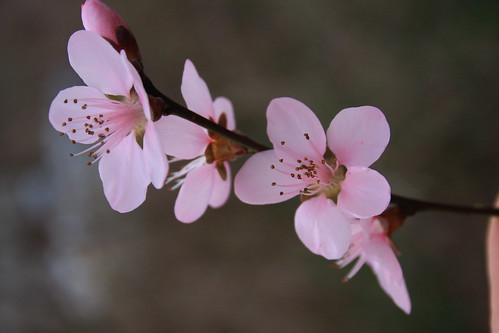
Wild peach, blooming at garden's edge.
(*photo credit)
May 8, 2014 May Is the Perfect Gardening Month
For us in this part of the world May is the prime month for successful gardening. This is the time to stop planning and swing into action, to till and sow and plant to allow time for a plentiful harvest by autumn. Granted, as said earlier that an early start is better, still for us in the Northern Hemisphere this is the final month before the heat of summer takes its toll on tender plants.
In May we gather in spring greens in all their freshness (scallions, radishes, lettuce, spinach, and other early varieties along with poke shoots). The peas, if planted in February as is our custom, are ready for harvesting as well. It is the month of garden salad and the first of the strawberries. For those of us with limited garden space, we complete the late spring planting as the space for greens is vacated. We do this by planting and sowing our tomatoes, peppers, melons, pumpkins, cucumbers, beans, and okra along with summer herbs. We continue to harvest but allow new plants the time to grow. In fact, the spring plants still to be harvested serve as living mulch until the introduced summer plants produce more of their own shade cover.
May is the time to add flowers to make this an inviting garden, and one protected from bugs through the use of marigolds and other flowers that pests avoid. May is the time to finalize the garden arrangement in order to produce a moving floral show during the year as each plant comes on its own. Many have grown plants from seed and this is transplanting season; others of us purchase the things we want from garden centers and consider ways of economizing space so the entire area gives a sense of garden fulfillment. Consider sprinkling the area with cosmos, for these give a variety of color to late summer and autumn; observe carefully so as not to remove the flower seedings with the weeds.
As the month progresses we have to replace the sowing and planting with tending and thinning. Many part-time gardeners are drawn to other activities and neglect that critical time needed for regular garden attention. If rainfall cooperates and we do not have to water regularly we tend to overlook the growing plants for periods of time. However, in our global warming conditions hotter weather comes soon enough and so do weeds. This is the time to conquer these unwanted plants through mulch and tilling. We often hate to thin what needs more growing space but this too requires discipline. One good thinning procedure is to replant in blank places the young vegetables that are too thick in spots. A second procedure is to simultaneously harvest and thin beets, radishes or chard tops as part of the thinning operation. Summer can come early so be on the lookout for pesky critters that may have survived our harsh 2014 winter. These can be removed manually at first sight. Good gardeners are expected to be alert.
Prayer: Lord, give us grace to be vigilant over our charges and to translate good gardening practice to our everyday life.
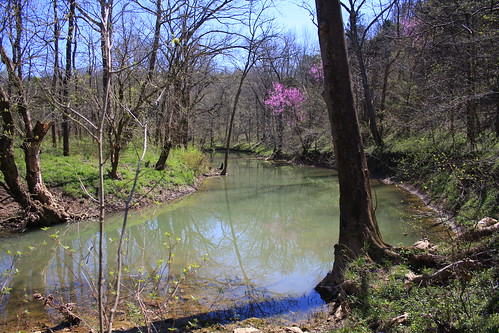
Creekside view, quiet moment. Anderson Co., KY.
(*photo credit)
May 9, 2014 Always Beware of Impulse Buying
Many purchase we make are done under impulse, if and when we have spare funds or imagined sufficient credit. Unfortunately, those living on credit accounts are less likely to withhold the impulse because they think for a moment that resources are there when they fail to consider the coming months. Material things are always enticing -- an added treat, a nice gift, a cute trinket, one additional comfort. Too often we are fooled to "save" through a sale that really means "spend." We are at the mercy of attractive storeroom or Internet displays, or convincing words of merchants who say "If you buy this one, also consider buying this associated gadget, device, software, or auto accessories." Displays plus the targeted words of salespeople combine to move one when preparing to make a purchase to move to follow those added IMPULSES.
Few of us are immune from some degree of impulse buying -- especially if we have just saved on a reduced price regular purchase. Stores and advertisers know that about half of all buying is by impulse. Shoppers say,"I went to buy a birthday card and look what I came away with!" Those added items are the result of seeing another good thing, or at least it seems so for the moment. Here we suffer from the addiction of the consumer culture that is seldom considered in all its materialistic reality. Is it the itch for convenience? The desire to equal peers with something fashionable? These steps may reduce panic-purchasing attacks:
* Get rid of the credit or debit card mentality and use only after determined to make a certain purchase -- since it is difficult today to continue solely on the cash or check economy. Live by a budget and think twice before each purchase;
* Construct a listing of short- and long-term needed items according to this established budget before going to the store or the Internet purchase site;
* Review the list immediately before entering the store to have clearly in mind what you came for, when you see so many other items on display. Stick to the list;
* Predetermine what items are being purchased and when moved to impulsively add an item, put this on a wait-and-see list so you have time later to decide. Most of the time impulses fade;
* Ignore much of the additional advertisements and enticing displays that don't pertain to what is the intended purchase item, and take particular care when talking about higher ticket items;
* Do not go to the grocery store when hungry. Eat a good meal and then shop for food and the impulses will be met in a rather reasonable manner;
* Don't allow eyes to wander about at the check-out counter, for displays are meant for last moment impulsive buying; and
* After getting home from shopping review any additional purchases and honestly ask whether the extra is truly worth it. It might be time to join the ranks of "Impulse Buyers Anonymous," an informal group devoted to thoughtful purchasing.
Prayer: Lord, teach me to be self-controlled in what I buy.
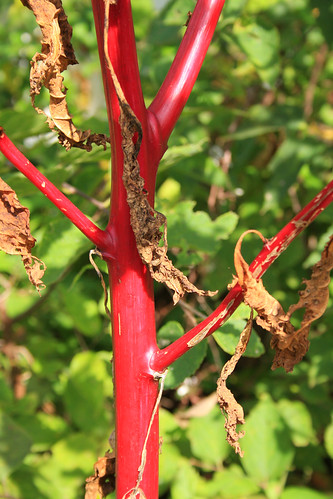
Brilliant red stalks of pokeweed.
(*photo credit)
May 10, 2014 Highlight Pokeweed Shoots and Berries
Any campaign to popularize our American "poke" or "pokeweed" plant (Phytolacca americana) does not meet with enormous success. In part, this is because the root of this beautiful plant is extremely poisonous and used as a natural pesticide. Pokeberry juice would always intrigue us as something to cover our faces and arms. A Filipino visitor to our nature center admired the natural splendor of our pokeweed plants. Maybe we Americans should treasure the beauty as well, especially since pokeweed can easily endure dry summers with no watering. Certainly, it proves hearty as well as pretty, for pokeweed is one of nature's treasures.
Poke shoots are the main ingredients of "sallat," an Appalachian delicacy that we eat in springtime and slightly beyond. When the shoots come up, one can prepare them in the same manner as asparagus sprouts. I like a cream sauce with some salt, pepper, and hot sauce to bring out the flavor. It is a near thing to asparagus and does not require the tender loving care that rather finicky asparagus requires. Poke just keeps coming back year after year, though it likes composted soil best. I cut the shoot even after the red skin appears (most regard that as poisonous). I simply skin off the red layer and throw out the first and second pans of boiled water because, otherwise, the poke is a little bitter. The leaves are also wonderful and nutritious when prepared like spinach. I use both leaves and sprouts well into the growing year, though early tender ones are best. They regenerate rapidly.
Poke berries, which form in large clusters in late summer and autumn are excellent as an herbal remedy for aches and pains. Older mountain people boil some of the red juice (good for dying cloth as well) and feed it to ailing livestock. One older Appalachian herbalist recommended that the berries (it only takes about a dozen clusters for a year's supply) be frozen and one berry swallowed whole each day. I find that my family arthritis problems do not haunt me as they do other members. I recommend this, but have found others who are afraid of poke berries opposed my mentioning this issue eight years ago in the Daily Reflections. Remember to swallow the berry whole and not chew the seed, though I hear about people who gobble down berries in large amounts and have never gotten sick. Is it because poke berries are free, that they are not regarded as being as effective as $50-a-bottle pills?
Is it possible that poke's bad reputation is because some are allergic to pokeweed, just as there are those who can't eat nuts or are lactose intolerant? Perhaps! Though one must caution that the roots are truly poisonous (just as are non-fruity parts of the tomato), it does not imply we are to avoid the entire plant. Natural plants have different parts and uses and each must be respected. Start using them cautiously until you are sure you have no allergies -- and then enjoy poke, a gift from God.
Prayer: Lord, help us love the gifts you have given us and let this include the beautiful pokeweed plant.

Curious about a new visitor...
(*photo credit)
May 11, 2014 Reflections on Good Shepherd Sunday
You have gone astray like sheep, but now you have come back to the shepherd and guardian of your souls. (I Peter 2:25)
The fourth Sunday of Easter has for centuries been regarded as Good Shepherd Sunday. The basic story of Jesus as shepherd is quite familiar to us, even if we are not familiar with the art of shepherding and how sheep behave. We look to Jesus as our shepherd for he guards us and is our sheepgate; likewise he teaches first the church leader and then all of us to be shepherds to others. This is not an obedience training on how to be good sheep. Rather, we learn how to serve others through alertness to their needs (responsibility) and caring for them. This is not a power play by shepherd over sheep; the Lord shows us how to be good caregivers, not lording over the flock. Jesus acts as shepherd with:
1. Responsibility or willingness to do all needed. Hired hands do not have this sense of concern and care, of willingness to defend another from all dangers.
2. Calling each by name or a tender, loving care for all, including those that are not of this fold or have been lost.
3. Freedom to do this completely with an absence of force. Jesus lays down his life for his sheep freely.
Being responsible, health of others. If we were to live under a dictatorship, we would be expected to be docile and conforming without being rebellious. Being good sheep may possibly have a place in a totalitarian state, but we are citizens within a democracy. This democratic spirit is fragile and can be lost if we overlook our civic responsibility as democratic citizens: voters, guardians of the liberties of our people, and responsible for the needs of the least among us. Responsibility includes adequate food, affordable housing and comprehensive health care, especially for Americans still not covered by health insurance.
Calling each by name. We all are called to become concerned about the welfare of others. To say "good bye and good luck" to the rest of the world is unchristian. As a people who care, we may not know every name, but we do look around and see neighbors who have urgent needs. They are our brothers and sisters and we are shepherds, not sheep; we lead and serve, not drive them.
Acting freely. Jesus gently invites us and we freely accept his invitation to participate as members of his divine family. Our response is like his, not threatening, but gentle concern for all. We must condition our response according to our talents and the inspiration of the Spirit acting in us. Make sure we can help or at least know where those in need can get good assistance. Truly, shepherding is a challenge and involves both freedom to accept Christ as shepherd and creativity in being shepherds to others.
Prayer: Lord, teach us how to be good shepherds and to be willing to be shepherded if and when the need arises.
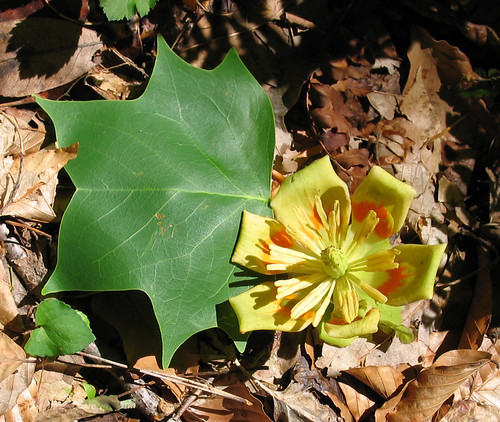
Tulip poplar flower and leaf, Liriodendron tulipifera.
(*photo credit)
May 12, 2014 Promote Nurses as Model Caregivers
Florence Nightingale, a world famous nurse, was born 194 years ago today; she became the model for all modern caregivers during the brutal Crimean War. Florence maintained a cheerful attitude while intensely devoted to patients in field hospitals which lacked all but elementary sanitary conditions. She became a model for all caregivers who followed.
I come from an extended family that has had about as many caregivers as farmers: four aunts were nurses and aides along with six first cousins as nurses and two also as medical doctors; and quite a number are emerging in the next generations as well. What strikes me in knowing these and others of the thousands of caregivers helping the sick is their practicality, as well as cheerfulness, even amid the most trying conditions. Nurses and doctors work long hours and yet are always ready for duty, even when sudden emergencies occur. They often earn good salaries and deserve to; they are more restricted by paperwork than in former times and find this draining; they are most willing to speak out about questionable medications for the sake of patients.
Nurses have many general characteristics that should be regarded by all budding Earth healers. For one thing, they must be proficient and practical within a process that takes time, not expecting the impossible and yet awaiting recoveries as a goal. They soon discover that they cannot be lone rangers in health care, for it takes teamwork. Earth caregivers must stay hopeful when conditions seem quite dire; they are expected to maintain what in maritime language is an "even keel." They must exude confidence, even in a global warming epidemic. Health of our Earth is a common goal, and it will take coordination in order to preserve.
We all ought to hold nursing with the highest regard, because nurses give a needed dose of compassion in a busy world. Nurses help us all, and when greater needs eventually arise, I am certain they will be there for thankless but demanding tasks. Young people looking for careers ought to be encouraged to become caregivers and fill the vacancies that are now opening as we seek greater health services for all. We are inclined to ask whether wealthy nations expect nurses from poorer nations to supply our country's medical needs? Far better to encourage our own young and second-career folks to take up this noble profession and allow those noble folks to fill needed roles in their own countries.
Secondly, let's encourage some with practical nursing skills to become Earthhealers either full or part time. Nurses can accept their limitations and that of those under their care. Caregivers must be so they can do; they themselves receive care by osmosis in return and learn, through sufferings of others, what they are to do and be. Let all earthhealers learn from nurses.
Prayer: Lord, touch the hearts of many more to be good caregivers for people and Earth herself.
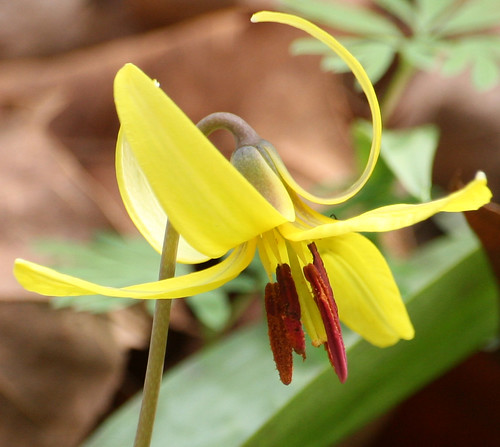
Dayhike to the Daniel Boone National Forest.
(*photo credit)
May 13, 2014 Plans, Plans, and Summer Plans
We live in a world of time budgets and plans -- planned work, travel, retreats, and vacations. Those of us who think our lives are fleeting and time is precious accept the term "compulsive planners." We set aside time for yearly, monthly, weekly, or even daily planning that gives order to life. Some informal folks prefer to go through life unplanned, except for major celebrations once in a blue moon. Admittedly, I occasionally envy them. However, time is precious and fleeting, a gift to steward with some exertion of effort.
Compulsive planners ought to beware. Abrupt changes can come with an unexpected accident or mishap -- but even this eventually can be considered. Plans are not idols; illness can change "the best laid plans of mice and men." Some may ask -- do you program in your own demise? Remote planning certainly does have a place. The key to an unstressed planner is coping with unplanned events. We are not in complete control of our lives, for only God owns our time and we simply try to use it well. Having said this, let's ask whether we have started our summer plans? Here are some hints:
* Check out the basic itinerary and plan stopovers for the entire travel time, find travel distances between points, determine where major construction projects are occurring and plan alternative routes, and size up costs;
* Budget time and costs for trips allowing for places to stay, routes to travel, what to pack, papers (insurance, passports) to bring; also tell friends where you are going for emergencies;
* If doing outdoor hiking or other exercises, anticipate and inspect proper camping gear (backpacks, tents, sleeping bags, inflatable mattresses, flashlights, rain gear, food and utensils, clothes line, boots, matches in a waterproof container, and possibly a camper stove);
* If traveling near home, consider sights worth seeing, reasonable quality places to eat, or what should be brought along for snacks or meals depending on mode of travel;
* Take along materials to help record time spent and trips according to the most comfortable mode: camera, daybook, or writing or other recording materials;
* In traveling by auto, when do you do the regular inspection and what needs to be taken (tire pump, jumper cables, and flashlights)? Please get the auto checked before a long trip; and
* Plan in some rest time during the summer and remember this is a good time to make an annual retreat and continue planning.
Prayer: Lord, help us be good planners while aware that you are in charge of our time and we are mere stewards of this gift.
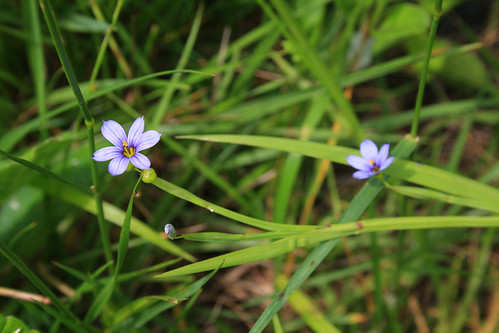
Sisyrinchium angustifolium, blue-eyed grass, in Kentucky meadow.
(*photo credit)
May 14, 2014 Iraq Crisis: A Three-Nation Solution?
In March 2003, some of us (anti-war) folks said "don't," and took criticism for opposing that Second Gulf War. But our grief was minor compared to thousands who returned in caskets. And what about tens of thousands of lamenting "Iraqi," if we can use that term when nationhood is not accepted by all? Should Iraq have been created in the first place? Had Allied powers after the First World War established a federated state (and included Kuwait, Syria and Lebanon as well as the Gulf emirates), the picture might look different today. Maybe! Mix regional politics with one of the largest oil fields in the world and one has a target for suicidal terrorists bent on creating a new world. How much do massive oil reserves and potential profits fuel this conflict?
The U.S. entered the fray and helped stir a Middle Eastern hornet's nest; we tried our hand at misguided nation-building for parties who did not want marriage and where no nation has existed for long periods of time. We Americans were poor students of history and didn't realize that our basic unilateralism in a globalized world was highly flawed. Add to this our American heavy-handed firepower, planes, and mere presence, and success was not total. The imposition of a military solution did not work after the expenditure of hundreds of billions of dollars in materials and thousands of lives. In many ways, this was a civil strife that continues today with the Syrian civil war waging just across its 400 mile common border.
The continued chaos in Iraq still calls for a three-nation solution, as we suggested today eight years ago. The current government is allowing its security forces to act like a regional militia, and this is not enhancing a unifying movement. Sunnis want no part in a government unable to solve its internal problems, which apparently involve even internal strive within the distinct ethnic groups themselves. Perhaps, and only perhaps, if Arab Sunnis focus on life in the middle area, Kurds in the north, and Shiites in the south, with territorial allowances for smaller minorities, will separate states develop and hopefully federate on for common commerce and defense purposes. The Sunnis must also benefit from growing petroleum revenue. A big condition!
Oil exports are part of the brew as the Kurds build a pipeline into Turkey to export oil, against the wishes of the central Iraqi government. Furthermore, oil pipelines in Iraq continue to be sabotaged, though quickly repaired. Mixed neighborhoods plus the oil reserves are a dangerous brew. Granted, separate nations may not suit the Sunnis who would control little or no oil, but even their residents will tire of the bloodshed and concede to an imperfect solution. If the three ethnic groups move to separate regions, the better the chances of reducing violence. And the Christian and other minorities must be respected.
Prayer: Lord, grant the wisdom for concerned people both inside and outside this region to solve the Iraqi crisis.
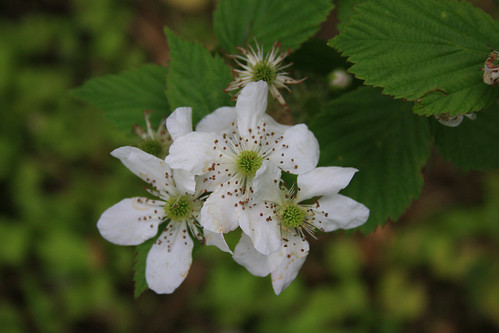
Blooming blackberries along homeplace fence.
(*photo credit)
May 15, 2014 Changing Lawn into Edible Landscape
At various times in these Daily Reflections we have spoken of converting lawns that use expensive resource-intensive (fuel for mowing, herbicides, water, etc.) and monocultural grasses into edible landscapes. This involves combatting the monotonous expectations of neighbors who think in one-tract concepts of what neighbors should do to upkeep community appearances -- the "group think" of modern culture. Many lawn owners prefer not to risk possible criticism of doing something different. This occurs even when convinced of benefits from lawns with trees, productive vegetable and herbal areas, wildscape for birds and certain wildlife. Complainers of too much work forget that, except for initial conversion, it takes less time than ongoing lawn care.
One solution is a partial edible landscape. That is, to plant fruit and nut trees and some berries in smaller numbers at first and allow these to mature over time. A gradualist approach has a number of advantages: domestic peace with others who do not want dramatic changes in an abrupt fashion; a growing acceptance by all concerned over time; and the benefits of fresh fruit that is hand picked in about five or so years. Tree care does take some effort, especially just after planting and in the event that the first years require watering saplings. Deer or rabbit problems may occur, and so protective screens and coverings may be necessary.
Select fruit and nut trees that are well suited to one's microclimate, soil conditions, and potential domestic pest problems. To minimize trial and error, inquire from county agents or neighbors and friends who are successful what types to select. As we convert our two acres of parish church grounds to edible landscape, we have added a number of apples (some replaced due to rust problems), peaches, pears, cherries, plums, nectarines, mulberry, hackberry, pecans, hazelnuts, chestnuts, grapes, blueberries, raspberries, and pawpaws. We allow brush buildup in so that small wildlife has edible landscape along with protective space even in an urban area. Some like "clean" space but discover the value of wildscape for native wildlife (ground and regular squirrels, rabbits, and a host of birds).
A longer outlook. Patience has something to do with developing an edible landscape. After one decade, we in the parish have about 40 trees, a half dozen variety of shrubs, and about one-tenth of our extensive landscape is in productive vegetable and herbal space. Our town has ample yard and other space, so that we do nor have to lease land for community gardens. Rather we regard this as a community meditation garden. We hope all flourish though we had to cut several older trees due to aging. In actuality, the summer shade offered by our mature trees has been a net savings that is deeply appreciated, for it allows us to curb air conditioning.
Prayer: Lord, allow us to see our landscape as productive in many ways and yet also be beautiful and inviting.
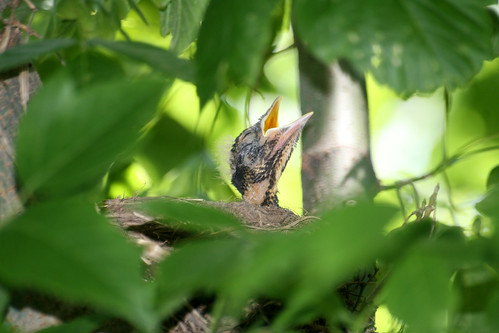
Spotted along a bike route near University of Kentucky campus.
(*photo credit)
May 16, 2014 Celebrate National Bike to Work Day
Today is not a distraction or a lark; biking is one ingredient in healing our wounded Earth, and we hope millions consider means of getting to work -- especially when commuting by auto. This is National Bike to Work Day, a good time to reflect on all the non-renewable fuel energy it takes for commuters who drive or even take public transportation from home to work and back. If this does not apply to those working at home, at least make it a conversation piece with those who may have the opportunity to get fresh air and save fossil fuels by thinking about using a bicycle.
I will never forget the single morning experience I had in Amsterdam, the Netherlands, four decades ago. I entered a busy street in rush hour and found it almost silent, except for the swish of hundreds of bikers going to work at rather rapid speed. Here was a bicycle economy and it was working. I presumed they all liked getting their morning exercise and breathing fresh air at the same time. At that time I resolved and did go to work by bike when in Washington DC. However, biking makes us vulnerable to roadway surfaces and oncoming traffic. I had a spill on a bike on a gravel walkway as I cut across the Capitol grounds going to work -- and almost got hit by a bus on Independence Avenue coming from work. This mode of travel certainly works best in a bike friendly place.
Biking is not meant for everyone, all the time, or in every place. It takes skill, alertness, and energy to negotiate the bike in heavy traffic or over longer distances. Cyclists, when preparing for the day and concentrating only on biking, may lose the precious time otherwise given to organizing thoughts for the workday on public transport. The weather may also make biking quite uncomfortable and even hazardous. And not least, many commuters live great distances from work, and the routes may either not permit bikes or may prove dangerous even when using colored jackets and helmets. If just beginning to bike to work, take special care to plan the route, give enough time, have a safe place to park the bike, and dress properly for the trip.
Some extra observations: Remember, auto drivers out there are running late to work and are in a hurry. In our Appalachian region with heavily congested roads and narrow shoulders to the pavement, it is not always advisable to bike to work. If judged not to be safe, don't even risk it, for you do not have to be martyred because of shortage of bike lanes. Don't laugh; a member of our staff at ASPI, Russell Parmes, had a habit of biking and was killed on a Monday morning when a student was attempting to get to college fast. When lacking bike lanes, our auto drivers push the weak aside, and bikes must compete with these powerful vehicles. Better, spend the time working for bike-lanes and more friendly roadways. Tell that to previously biking Chinese who are buying cars at a rate of over ten million vehicles a year and their cities have all the extra auto congestion as well.
Prayer: Lord, help us choose good practices such as biking.
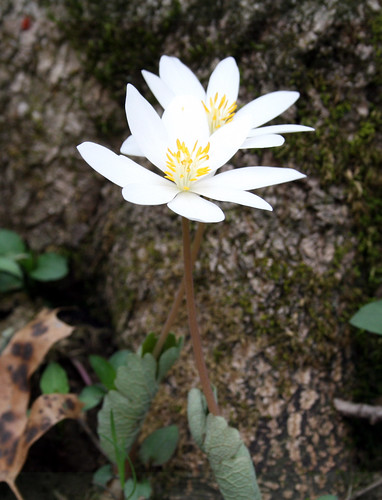
A lovely find in spring: Bloodroot, Sanguinaria canadensis.
(*photo credit)
May 17, 2014 Treat Chemicals with Respect
The chemical spill a few months back in the Charleston, West Virginia area opened questions about the toxicity of the coal scrubbing chemical that was used heavily, even though not fully tested. Decades ago in the early days of USEPA a citizen's panel on which I served recommended that all industrial chemicals be thoroughly tested, for we should prove safety first, not after harm or potential harm occurs. Chemicals are full of mystery, quite complex in their structure and activity, but with unknown side effects. Chemicals in an acidic stomach can trigger discomfort and reactions with other ingested chemicals. Coroners say that two or more strong drugs can kill while addicts sleep; it is often nearly impossible to determine the precise cause of death.
It takes expensive analytical equipment to detect, isolate, and determine chemical structures; sometimes they prove unpredictable as to toxicity; they may have synergistic effects leading to even more severe toxicity when in the presence of other chemicals; they may be simply not thoroughly researched as to acute side effects or dangers due to long-term exposure. When required in large amounts, chemicals can do harm to unsuspecting workers and consumers. They may remain around for lack of natural detoxification potential; and they may not be disposed of easily because of inertness to natural decomposition -- and thus the need for complete containment (nearly impossible), or incineration or other safe disposal procedures.
A consumer culture of disrespect for materials extends to the manner in which one consumes or refrains from chemicals that may be helpful in small doses and toxic in larger amounts. One generation ago consumers avoided chemicals whenever possible; now they treat them with disrespect because they hear or see on TV that they have some good effects. For instance, hexachlorophene is a good anti-bacterial cleanser, but can cause brain damage in high concentrations. Chemicals essential to the body (e.g., vitamins) may be toxic in higher doses. Drug advertising is completely misleading for we who are unprofessionals to know which one to take. This lax attitude makes users fear less, for familiarity breeds contempt. The steep rise in the number of deaths from drug overdoses in Appalachia and in other rural and urban areas of America has left most of us bewildered. How can we stop this needless loss of life? What part do chemicals play?
In our neighboring county a social worker estimated that one- quarter of the people have a drug problem. When asked, my stock answer is, "No, it is closer to 90%"; all our population has a massive drug problem, because they are bombarded with over-the-counter drugs, prescription medicine, chemical food additives, and all domestic products (cleaning agents, paints, polishes, etc.). Stop medicine ads, remove additives from foods, make over-the-counter drugs less accessible, and improve drug treatment programs.
Prayer: Lord, help us to respect the chemicals we use.
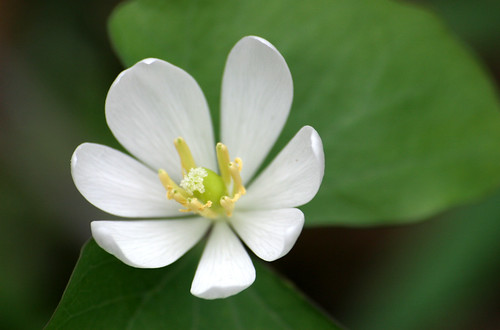
Twinleaf, Jeffersonia diphylla, Appalachian wildflower.
(*photo credit)
May 18, 2014 Jesus: the Way, Truth and Life
I am the way and the truth and the life. (John 14: 1-12)
In this season of Easter we both discover Jesus as way, truth and life, and in the spirit of the season of renewal, we become other christs and try to imitate him in our own lives.
Jesus, the way -- direct route to salvation, moral virtues to live by, road map on our journey, gate of God, path by which the Father is known to the world (John 1:18; 12:45; 14:9), trail to calvary, venture to save others, passage into the New Covenant, road taken together, focus of our earthly sojourn, and opening to future glory.
Through our lives we show confidence in the way we journey to God, and we offer gentle help to others on their road to glory as constant companions. Many are wandering about not knowing where they are going; we must be the compass to help them rediscover the straight and narrow path with their feet planted on the ground.
Jesus, the truth -- teacher par excellence, message found in a person, compass of our intellectual pursuits, foundation of divine understanding, goal of our constant questioning, faithful witness to the Father, eternal word, willingness to teach through service, Good News proclaimed to all creation, personification of our worship "in spirit and truth" (John 4:23), kairos or the acceptable time of opportunity, delight of the Father.
We present the Good News and show others that it is part of our evangelistic mission through the joy we exude to others. We are called not to lord over all creation as worldly tyrants but to serve them by showing the fundamental truths that keep us secure. Together with trust we can help establish the Kingdom of God.
Jesus, the life -- perfect life, totally of service, knowing the Father present in the Son, offering to others as Body of Christ, celebrating with the happy ones, suffering with those who are persecuted, witnesses to Good News, giving the Bread of Life, dying so others may have life, forgiving and healing, sending the Paraclite, and exuding eternal Love.
We are deeply grateful in being invited into the Divine Family through the grace of Baptism. We are to live a life of enthusiasm (the God within) in the calling to be a chosen race, a holy nation, God's own people. Through our vitality, we enliven and give hope to a tired world of cynicism. We inspire others to rise above allurements to participate in building a new world. Life is worth living through meaningful service to our brothers and sisters.
Prayer: Lord, give us the courage and strength to be the way in a twisted world, the truth amid chatter and false directions, and life combatting the culture of death and despair.
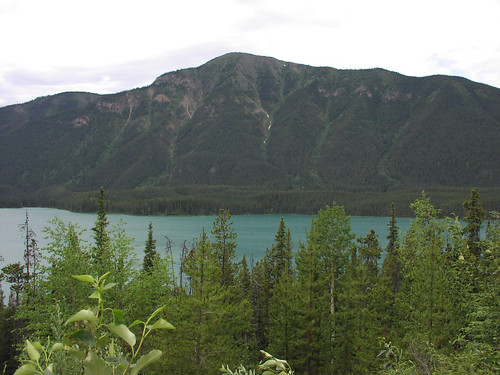
Lake of blue, along Canadian Rockies.
(*photo credit)
May 19, 2014 North American Community, Oil and Jobs
Oil is just slick enough to make or break friendships, and we wonder what this will do to the traditional relationship between the U.S., Canada, and Mexico. Our Canadian brothers and sisters want friendship along this unguarded border. The very conservative prime minister of Canada is putting pressure on our government to accept dirty tar sands oil as fuel in a world that ought to be giving more attention to renewable energy projects; he has made it an ultimatum that we take the tar sands from up north and send it through an ill-fated pipeline (see May 14) to our Gulf Coast, even for possible trans-shipment to overseas markets -- if U.S. laws allow it. Gluing us together in trade seems progressive enough and includes oil-producing Mexico as well. However, must we appease voices among our neighbors or look at this as a family controversy?
A broader vision. If we are brothers and sisters, we must be willing to see each other as such and not defer to powerful voices like Big Oil or certain leaders. That is intimidation from the outside, not discussion within a family. We certainly ought to be sensitive to the needs of our neighbors, but also be on the lookout as to how to make life better for all of us, not just the citizens of one or other country. Through closer union, we can appreciate the struggles of all of our families seeking to live a higher quality of life. Our three countries share much in common already -- land masses, sizeable minorities from the neighboring lands, security concerns, terrorist threats, interchange of populations on a regular basis, a common Christian heritage, the need for interaction on natural disaster issues, and trade and commerce.
Cultural riches and diversity. North America has welcomed many cultures over the past five centuries, and the native American population, for better or worse, has always proved hospitable to the newcomers -- who have not always proved the best guests. We are economically and culturally becoming more united and learning from Canada how to make bilingualism work for mutual benefits. Bilingualism for both Mexico and the United States would be a good thing for the sake of immediate communications and for the better understanding of diverse cultures.
A future good. Some North Americans complain that the Mexican undocumented laborers have replaced them through a willingness to accept lower-pay scales in the job market. That complaint may have a tinge of validity, but all too often the jobs accepted by illegal migrants go wanting without their presence. This means we would be without some of the food we eat without their contribution to the hard field work. The economy has been so constructed as to have a niche for the lower paying, difficult tasks of field harvest and other undesirable occupations. We need not put off any longer the fair and just legislation that would put many of such people (all too often Mexicans) on a path to citizenship. Why the delay?
Prayer: Lord, do not let differences and unjust attitudes hinder our quest for friendship among nations.

Mother coyote spotted on dayhike. Washington Co., KY.
(*photo credit)
May 20, 2014 Coyotes Fill the Carnivore Niche
Coyotes are now as American as apple pie, though that was not the case when I was young. Now, on a clear night in virtually every state except Hawaii, one can possibly hear the howl of the coyote, Canis latrans (barking dog) or, if the animals are closer, the high-pitched yips that they customarily make. Lewis and Clark called them prairie wolves. The coyote is North American to the core, a crafty cousin to our familiar dog, has a keen sense of vision, smell, and hearing, and is capable of living in a wide variety of places (mountain elevations, deserts, prairies and even Central Park in New York). Within our lifetimes, the opportunistic western coyotes have come east crossing the Mississippi, and they now inhabit all of continental North America except the very far north of Canada. They move rapidly, do not hibernate, and operate singly or in packs, night and/or day.
Coyotes have a quite adaptable lifestyle: they have discovered the advantages of living near human settlements and accessible food supplies, handily filling the environmental niche left by the demise or decrease of gray and red wolves, bobcats, and foxes. Coyotes hunt and can control populations of mice, rabbits, ground squirrels and even reptiles; in packs, they prefer a diet of plentiful eastern deer. However, their tastes are quite varied -- from carrion to fruits, berries and vegetable matter. In packs, they can attack larger livestock, from ponies to calves and even sickly cattle and horses. In suburban and increasingly city areas coyotes look for outdoor pet food and even small cats (a favorite) and pups (large dogs can fight them off). Generally, the coyote is shy and stays at a distance from human beings. My friends, Phil and Mary Stern, have a pack of coyotes, which stay near their residence and act as watchdogs when they are away. They await their return and then slip back into the woods.
Coyotes generally avoid people, but attempts to feed them may endear them to a place. However, their coming too close could result in bites demanding painful rabies shots. Reports show about 200 attacks on people, especially in California, in the last four decades. Generally sheep and cattle farmers out West regard coyotes as a notorious pest and hunt them down throughout the year, since they are non-game wildlife with no specific hunting periods (only daylight hours in Kentucky) and a bounty in some states. In fact, coyotes are America's most hunted animal. The government has a program to trap, shoot, and poison coyotes. Still, their numbers continue to climb and their range expands. Many folks with an environmental streak regard them as wildlife control agents.
Coyotes are certainly here to stay. They can breed with their wolf and dog cousins, forming the "coywolf" and "coydoy," and even over time have the capability of forming a hybridized new species. They have found their biological niche and are using their crafty skills to survive. Listen for the howl of the American coyote.
Prayer: Lord, help us to appreciate and make room for coyotes.
<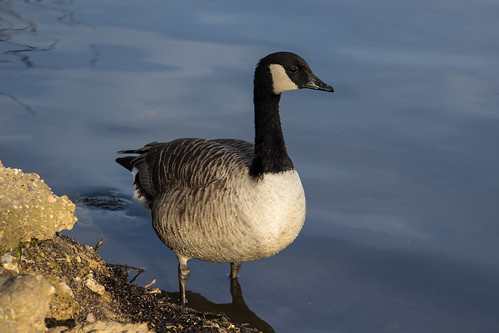
The Canada goose, Branta canadensis.
(*photo by P. Jane, Creative Commons)
May 21, 2014 Traditions, Mother Goose, and Nursery Rhymes
For many of us older folks it has been a long time since we have heard nursery rhymes. Recall "Humpty-Dumpty," "Little Boy Blue," "Jack and Jill," and "Peter Piper picked a peck of pickled peppers"(or some two dozen other of 75 nursery rhymes listed on the Internet under "Mother Goose"). Most of us in our early grades remember Mother Goose rhymes -- ancient memories still imbedded in our aging craniums. "Baa, baa black sheep have you any wool?" These ancient rhymes seem so innocent yet have political and other cultural significance that goes far back in history. One disputed theory is that one rhyme goes back as far as the Black Death in the 14th century (the first line on facial condition of victim, the second on flowers to protect against the smell, the third on cremation of victims and the last on death). What a rhyme! The first verse of the American version first written from the oral tradition in the 1880s goes --
Ring around the Rosies
Pocket full of posies
Ashes, ashes,
They all fall down.
Others have positive messages such as Humpty-Dumpty, where broken social relationships cannot be easily repaired. We find that we apply the moral proverbs almost instinctively, or at least hardly noticing what we are doing. Thus pre-schoolers and kindergartners are becoming acquainted with the same verses we learned decades ago -- a passing down of authentic oral tradition. The act of passing down binds various age groups together within a culture. When we read, teach and even hear the same words retold that excited us when we were younger, we return to a state of mind and aspirations that were part of our early lives. It is like recalling a scent or taste, and this allows us to share with a new generation what we treasured with peers in our youth.
Today there is a movement to advance education downward to youngsters. Though pre-school programs only touch a minority of Americans, still these have a powerful socializing effect and are opportunities to prepare toddlers prior to the kindergarten and first years of formal education. Proposals have been made in Obama's State of the Union and in State of State addresses, even though we are all fully aware that upper grades and academic institutions are hard-pressed due to limited education funds.
Additional reasons couple social and educational benefits to youth with family benefits. Such programs allow parents to work in other occupations for added parts of the day. Educators are generally well experienced in child-rearing and thus qualify for the job-intensive occupation of pre-school programs. This is money well spent, providing far more jobs per million dollars spent than does catering to the military/industrial complex. Pre-schoolers learn nursery rhymes in company with others of their age.
Prayer: Lord, help us teach traditions to another generation.
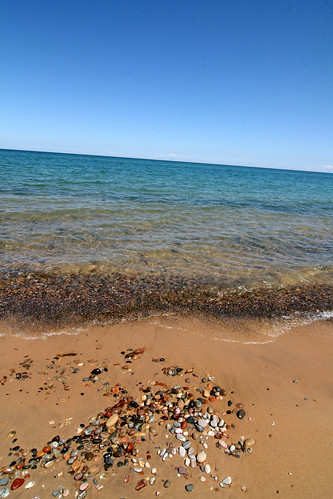
Blue skies and sparkling water make for splendid memories.
(*photo credit)
May 22, 2014 World Diversity and Maritime Day
From astronaut space photos, Earth's oceans shine like sapphires framed by green and brown land masses. These massive water bodies are fragile and can be damaged by mistaken policies. Today we can connect a celebration of world biological diversity to that of maritime matters and list environmental threats:
Corporate fishing. With increasing demands on shark fin soup and fish products of various types, the stocks of the oceans are being depleted at an accelerating rate. The world annual fish catch peaked at 86.4 million tons in 1996 and has gone down since to 78.9 million tons in 2011. Factory ships are frightening in their greedy hauls with estimates as high as 40,000 square kilometers of seabed scouring per day (really?), leaving dead zones that take decades to recover. (Ref. "The World in 2014," The Economist p. 77). Policing oceans requires joint navy action.
Rising oceans. The rises in water levels are due to warmer oceans with corresponding water expansion and addition of melt from glaciers and icecaps. Last year a cover of National Geographic showed Manhattan Island partly submerged from rising ocean levels. Maps inside of that issue show land masses of where almost half the world's population living in seashores could be inundated by rising oceans by 2100. Entire Pacific nations could disappear, along with low-lying Florida.
Tsunamis and oceanic storms. Within this century our planet has experienced two severe tsunami events that killed an estimated 200,000 people in the Pacific and Indian Ocean rims (December 2004) and did massive damage in Japan (March 2011), along with an extreme weather event in the Philippines last year that killed thousands and displaced large numbers. Improved early warning systems could have helped in at least the first case. Climatologists have predicted a correlation between ocean temperatures and climate effects -- and that does not bode well for the next generations.
Ocean acidification. Intake of the increased carbon dioxide emissions into oceans have resulted in larger degrees of acidification that has effects on many maritime species and especially fragile coral reefs.
Piracy on the Oceans. Perhaps a bright spot on a dismal maritime picture this year is the improved policing of frequent pirate activities off the coast of Africa -- and this is the result of big money calling for safety for oil tankers and other precious cargo. When money and guns speak, it overwhelms pirate operations. What this tells us is that better enforcement of the oceans are called for on all fronts, especially to preserve the biodiversity of our oceans -- a possible major United Nations project.
Prayer: Lord of the waters, inspire within us as one people a sense of respect for the grandest of Earth's commons, our oceans.

Marbled orbweaver spider, Araneus marmoreus.
(*photo credit)
May 23, 2014 Respect for the Web of Life
I have set before you life and death, the blessing and the curse. Choose life, then, that you and your descendants may live. (Deuteronomy 30:19)
The "web of life" is a combined scientific and ecological term (especially related to spiders and their artistic work) and a moral connection of all living creatures. Life is truly fragile and interlocked; mutual support given to various forms of life protect the health of all life. The marvelous nature of this web of living things is being better understood with time; just as the web implies mutual support, so environmental damage touches the entire planet. Melting polar regions threatens the habitat of polar bears and seals; invasive species crowd out less aggressive native one; forest-dwelling, red-cockaded woodpeckers depend on tree health. We are truly interdependent creatures.
The theological significance of the web of life is more complex. The web of all life is based on the dignity of the creature before the Creator, and the respect that follows from our gratitude for being called to be responsible for life on this planet. All living creatures have special worth bestowed by the Creator and we are called to be of service to others, not to be oppressive lords of Earth. Jesus' teaching and his washing of disciples feet sought to give us a grand corrective: do not be worldly masters but rather loving servants in a responsible manner. All beings give thanks by existing, but we humans express this through protection that may demand an active component at times. All life, especially human life, belongs to God; whoever among us attacks human life attempts to attack God's very self.
We express this gratitude through both words and respectful deeds towards fellow human beings and all living creatures. We know we should not kill, but we also must, in choosing life, realize the entire complex of interwoven rights and duties required to sustain interdependent life. We may defend ourselves against an unjust aggressor, but that does not mean we are to kill another who has made some mistake in our society. The power over human life does not belong to us. In order to preserve and protect this web of all living things, we extend the prohibition of shortening life to include the elderly, infirm, mentally incapacitated, the unborn, and all threatened and endangered plant and animal species. All are precious before God, the author of life; all have a right to dignified living and protection. Many of us eat plants and animal products but some would like to prohibit eating of meat to all other humans.
In essence, the web of life is a reality treated both by science and Scripture, because it bears on our every action and calls for respect of all life.
Prayer: Lord, give us today a sense of respect for all life.
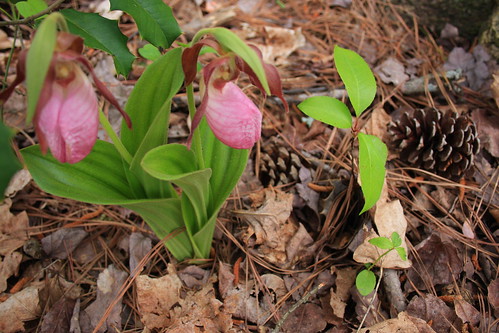
Pink ladyslipper orchid, Cypripedium acaule, in pine woods. Laurel Co., KY.
(*photo credit)
May 24, 2014 Consolation
Words of support
refresh the parched soul
like cool, bubbling water
from a hillside spring.
They are all the more welcome
when unexpected, and arriving
just when I'm down and out,
and have nowhere to turn.
They awaken within me
a sense of renewed hope
that I'll speak consoling words
to refresh another.
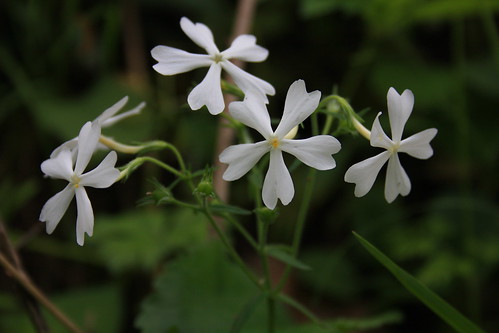
Unusual find: a white version of blue phlox, Phlox divaricata.
(*photo credit)
May 25, 2014 Jesus' Loved Ones and Associates
I will not leave you orphans; I will come to you. (John 14:17)
No one wants to be an orphan and Jesus knows this; he wants our friendship, and we in turn need all the friendship that we can get. Far too many people experience profound loneliness in their lives, but does anyone care? Does anyone love them? Part of overcoming loneliness is to have loyal companions, not "fair weather" friends, but those who have compassion and will suffer together with us in hard times. Some of us will disparage a "Jesus-and-me" spirituality, but they should not as long as we imitate Jesus by assisting those around us. The key to overcoming loneliness is to break that spell of isolation and extend the bonds of love to other isolated people around us.
We pledge our love to Jesus who loves us so much as to die for us; we do more than express this love in words; Christians must be people who love through deeds of good will. Such deeds are godly and show our participation in the Divine Family through Baptism. This is humble, not servile, service of a grudging slave, but a response to an invitation to be a co-worker with the Lord. Here service takes on a mature role of sensing the isolated condition of others without infringing on their self-respect and privacy. That takes a sensitivity that comes through foregoing affluence and living simply like those we strive to love. Our manner may be somewhat unique to our personalities and talents; in fact, we are moved by the Spirit to be ourselves and enjoy our work.
Just as the Lord becomes incarnate and one among us, so as disciples we are willing to immerse ourselves in a hostile world and be witness to our calling. We soon discover our limitations and that we need the courage that comes through prayer; God works through us in our quest for companionship with others. We may not have a miraculous power to heal or even the magnetism of Jesus, but our humble roles are still needed. Jesus prays at the Last Supper not to remove us from the world, but for protection (John 17:15) against the evil one who can stand in the way of our ventures in establishing companionship. Hardships and barriers are surmounted by being close to the Lord who helps us always.
Jesus' priestly prayer is directed at the disciples before him at table, but the direction does not stop there. The prayer incorporates us in our quest to imitate him -- a prayer that goes in time beyond the Last Supper of two millennia ago; this prayer transcends space and time and directs itself to our ministry of joining all believers in a vast effort to become companions in our journey together. If we were all truly one, the loneliness experienced by so many would evaporate. We cure the darkness of loneliness through God's love shining in our hearts and going out from there to others in need.
Prayer: Lord, give us a sense of love for others in the way you love each of us; allow us to serve through loving deeds.
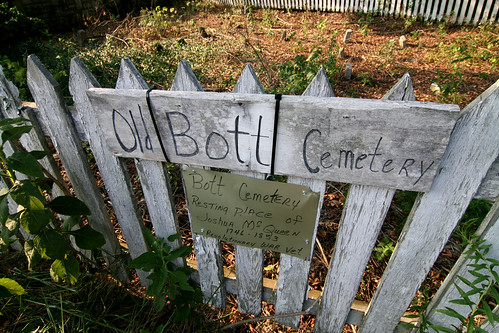
Old Kentucky family cemetery.
(*photo credit)
May 26, 2014 Memorial Day/Decoration Day
During the Second World War, on a Sunday near Memorial Day, our parish had a special afternoon called "Decoration Day." At these times we brought home-grown flowers by the buckets along with our lunches; Mama led the decoration of three generations of graves, and then we ate lunch with other relatives on the grassy undeveloped hillside beyond the cemetery grotto. On a full stomach we half-listened to a sermon on a pulpit with poor outdoor acoustics. I think this whole event was a throwback to days when it took so much time to get to Old St. Patrick's Cemetery from the surrounding countryside by horse and buggy. However, our memories were of car trips, but when gasoline was rationed. It made the visit, along with putting the flowers on the graves, a major Sunday affair. Few survivors can verify what transpired, for we elders now live with only memories of traditional Decoration Days.
The gatherings at cemeteries have decreased in popularity in recent years, but memorial events are important, even if done at non-specific times by small family clusters. Cars bring loved ones from distant places in less time than horses and buggies, and decorating graves is accomplished still meaningfully but quickly. The "family" comes back and is reunited in memories, prayers and placement of flowers on graves of those who have passed on. In more traditional parts of Europe the decoration and tending of flowers at grave sites is a signal that the memory is still fresh; when unattended, the grave is considered abandoned and the site is dug up, bones placed in an "ossuary" near or in the church, the grave reused -- and life goes on. Today, some circumvent these traditions by cremation and burying ashes or disposing of them in a dignified manner. What a pity that ash-scatterers forget the symbol of a designated sacred burial place.
Decorating graves is a physical act that shows public respect for the loved ones who sacrificed much for us. Decorating is a human act showing the joining of mortality and eternity. Our decoration shows a memory beyond the time of death, an appreciation of life, and a belief that life will continue after death and we will be reunited with loved ones. Flowers speak louder than words in this month of May; they remind us of the resurrected body that will rise from this sacred place for an eternal age. We strive to demonstrate, at least as long as we are able, our regard for the honored and loved ones who went before us. Love and respect are given with memory and flowers, both of which will last only a brief period and then pass on. Memories merge with undying spirit.
Memorials through decorations say more than cold granite and lifeless monuments, no matter how well annotated. It is important while we are able to show signs of remembering, through human acts of decorating the sacred places of our ancestors. It is our little sacrifice of time for those who sacrificed much for us, and it makes us aware that this freshens memories that also can fade.
Prayer: Lord, teach us to pray in words and in actions.
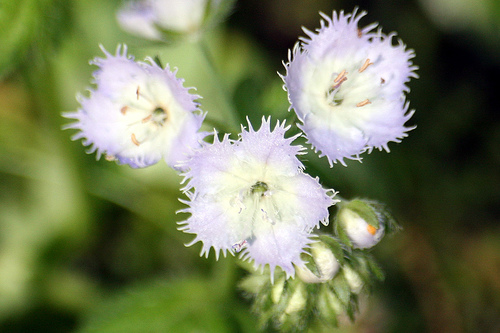
Miami mist, Phacelia purshii. Mercer Co., KY.
(*photo credit)
May 27, 2014 Believers and the Environmental Crisis
Believers of all faiths are needed at this time to combat climate change and affirm that the future is worth fashioning. Maybe that very statement may precipitate controversy, because some religious folks consider the duty to be silently and vigilantly watchful and await the Lord's coming. This gets at the heart of difficulties dealing with environmentalism practiced by active and passive religious people. How do we overcome differences? Better yet, how do we discover points of togetherness and celebrate these common traits: God as over all things, respect for life and all of God's creation, need to be morally responsible individuals, dignity of people who suffer from environmental degradation, and hope that things will improve through mutual cooperation. Undoubtedly, this list is not exhaustive, and a unifying quest is still a challenge.
The challenge can become a balancing act: bringing together diverse personalities, agendas, goals, and presuppositions. I speak from the experience of being the first head of the "North American Conference on Christianity and the Environment." It is certainly not on my CV for a good reason-- it had its good moments, but infighting was extremely draining. Never again for me! It was not basic elements of religious understanding over the environment that brought friction; rather, it was different goals of personalities with agendas as to where the group ought to be heading. I chuckle when I hear that two religious groups have come together on environmental principles. Of course, why not? They ought to agree, if they have valid religious aspirations. That's not the problem. Have them succeed in a common agenda when some hold passive faithfulness is enough, and others that we must change structures of society. Different agendas exist.
Challenges need not be pessimistic. Past experience teaches of pitfalls that can be avoided. One way is to focus attention on the environmental movement's total interaction, not on religious groups per se. Environmental cooperation can best be achieved by religious bodies working within a broader framework, including secular organizations and interests who believe in a future. Thus, a religious group can make a religious contribution without clashing with others over cultural differences and without attempting to pull one side over to certain interpretations held by strong personalities. Clashes have and can continue to occur among a wide variety of groups and that will be a matter of discussion in the upcoming sequel to my book of 40 years ago, The Contrasumers.
What is the future of interreligious cooperation? Groups that can cooperate in working on drought or other natural disaster issues in conjunction with the UN and other relief organizations have a bright future; those that study historic pathways are okay. And climate change issues offer joint challenges as well. As for individuals seeking to establish grand sounding super-groups, watch out. The wind blows from various directions.
Prayer: Lord, teach us to work with believers of all stripes.

Attracted to skin oils, Eastern black swallowtail, Papilio polyxenes.
(*photo credit)
May 28, 2014 Raising an Alarm about Climate Change
The late environmentalist Rachel Carson's 107th birthday is a good opportunity to speak out once more on the problems facing our world. Her alerts led to controls on DDT's overuse; we see a need to spread alarm about the virtual certainty of climate change that could deeply affect Earth for generations to come.
What do serious scientists say? In 2007, the Intergovernmental Panel on Climate Change (IPCC) concluded that it was "highly likely" that human emissions of greenhouse gases (GHGs) are warming the planet's surface. In 2013, IPCC raises its alert level to "extremely likely." This latest over 1000-page report is authored by 259 leading scientists and shows that levels of GHGs carbon dioxide, methane, and nitrous oxide are unprecedented in over 800,000 years. It states that oceans take up almost one-third of the excess carbon dioxide, but this is making these water bodies more acidic and thus hard on coral and other maritime life. From every major indicator, we observe ourselves recklessly driving 90 miles/hour in a 30-mile speed zone. Prudence does not mean "prove to me I am wrong," but that if we are most likely on a collision course we must make some radical changes.
This raises the serious question of what can we do about an addicted culture that denies what is happening. One response is not to focus on the strongly addicted, but on seriously concerned citizens who are trying to confront this environmental issue in a straight forward manner. Activists are trying to spread the alarm among socially connected individuals and groups through meetings, demonstrations, and petitions. While some would say that is not enough, still an important development this past winter speaks otherwise. AIPAC and other war-mongering groups lobbied and got promises of a veto-proof Congress to counter diplomacy efforts by stricter censure controls on Iran; more progressive groups presented 100,000 petitions and 10,000 phone calls and emails in such an unprecedented degree that Congress members back-tracked. Citizen action can have an effect.
NASA confirms that a dozen of our recent years have been the warmest on record, as many of us can testify. Glaciers are melting and calving at ever increasing rates. Four cubic miles of Greenland ice that reflected 90 percent of the sun's radiation back into space have each year become water with very small reflective ability. If oceans continue to rise in temperature, warming currents could be halted with dramatic effects on Europe's climate. Furthermore, extreme weather events will most likely become more frequent. In addition, when Arctic regions warm the side effects will be rapid liberation of methane now locked in permafrost, which is a GHG with enormous climate change potential. Once triggered, it will be harder to stop the human-caused warming effects.
Prayer: Lord, teach us how to sound an alarm without being dismissed as being an alarmist. Give those who can make a difference the courage to act properly in these difficult times.
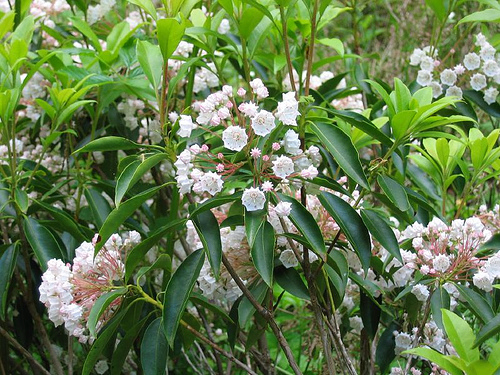
Mountain laurel, Kalmia latifolia. Bell Co., KY.
(*photo credit)
May 29, 2014 Avoid Idle Speculation
Why are you standing there looking at the Sky? (Acts 1)
We keep looking to the heavens, and wonder as I did as a boy "Why did he leave us alone? Jesus could have moved about and walked the Earth, showing everyone that a 2000-year-old was alive and well." However, with time it became apparent that this would not have been faith, but a fearful sense of someone who is quite quaint. God does not do things this way, and it is part of our probing the divine mystery that we seek to grow with the Lord in godly ways of thinking and doing. Christ comes among us; he teaches, and he suffers dies and rises for us; he blesses us and ascends beyond our sight in majesty. And we anticipate the coming of the Spirit at Pentecost. We are wrapped in the mystery of Jesus' departure, and in what God wants each of us to do to be like Jesus. Yes, Jesus is ahead of us in time; we hope to follow.
We need to have a sense of belonging with and in the family of God, and that means we are invited to help prepare for Christ's coming. I recall a Californian adobe-maker who said with tears in his eyes, that I was the first to ask him such detailed questions about his craft. I regret I was unable to return and videotape his work, and so his skill was perhaps lost with him. We should do more, for part of the mystery of the Ascension is to treasure and encourage each person in his or her preparing for the Lord's coming. We do not want it delayed, for only God can help us get beyond the mess we are in. We believers in the Easter event see this gift of life's renewal as expressed through our hopeful actions; this is our part in hastening the day of the "New Heaven and New Earth" -- but we must believe it can and will occur.
We are not left alone; we have the presence of God in our lives, when we pray, in the creative act of the world around us, and in the real Sacramental Presence. But we are torn as a believing community. Jesus has left us and the departure is always bittersweet; we hate to see him go, and yet he must so that the Spirit might come and be with us. But even then he did not totally go since he is present sacramentally even now -- for those with the eyes of faith. He beckons us to accept the Spirit coming to empower us, to make us work towards fulfilling the imperfect and unfinished. Like the Apostles we are slow learners, for at the moment of his departure they ask whether the Messiah would still come as a political leader.
"Go out to the Whole World and baptize them in the Name of the Father and of the Son and of the Holy Spirit." In this year of evangelization we are called to spread Good News and to do so joyfully and with confidence that the Spirit will give us words when needed. Simple folks became saints by patiently awaiting the coming of the Lord and accepting the mysteries of Faith without being overwhelmed. The Ascension is our heralding call to renewal.
Prayer: Lord, help us to see our role in salvation history.
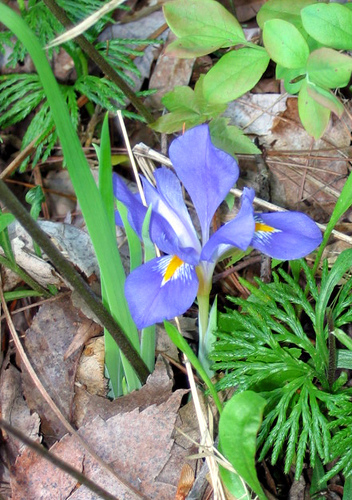
Red River Gorge hike finds drwarf crested iris, Iris cristata.
(*photo credit)
May 30, 2014 Reflect on the Life of Joan of Arc
Joan of Arc is a patron saint of France and is a highly popular saint through the memorials, stories, movies, and books on her heroic life. She was born at Domremy in Champagne, the daughter of farming folks. Her interesting but very short public life included visions telling her to rise and help save the French cause in the Hundred Years War and to intervene in a local civil war. She led soldiers into battle with a banner bearing the words "Jesus, Mary" and helped save Orleans, thus her title "Maid of Orleans." She engaged in other successful struggles and stood at the side of the king when he was crowned at Reims.
But in a short two years of public life this humble illiterate teenager was betrayed and sold to the English, who accused her of witchcraft and tried her on false charges -- for which she had no professional theological defense. Joan was condemned to die at the stake on May 30, 1431, in the marketplace in Rouen before a company of English soldiers (not another woman present). As the flames leaped up around her, Joan kept her gaze on the crucifix and cried out, "Jesu, Jesu." They tell us each soldier remembered her last words until the day of his death. A member of the English royal court said, "We are lost. We have burned a saint." Some twenty years after her death, the family asked that the case be reopened. The documentation was presented, and she was declared innocent in 1456 and canonized in 1920.
I do not just focus on the French, even though I like both Sts. Odile and Therese of Lisieux. While having a French bias, I do champion the causes of other young female witnesses: Felicity, Perpetua, Agnes, Agatha, Cecilia, Elizabeth of Hungary, and the Lily of the Mohawks, all who showed fantastic courage. It must have been hard enough to be women who made a unique mark in their male-dominated worlds, but with the grace of God each of these succeeded in her own way. We know much about several of these and surprisingly enough about my favorite of the day -- Joan of Arc (1412-31), who should not be confused with Joan of Aza who died about 1190 and was the mother of St. Dominic.
Courageous people stir us; we are blessed to have the Joans of this world. They deserve special attention because they live in a culture that chooses strange heroes and heroines, and yet their virtues speak volumes for all people, young or old, male or female. Our world needs Joan and other saints who remained faithful to the bitter end. They were mature in choices and knew sacrifices in ways we only hope to follow. Reading Joan's life still leaves two strong impressions: a deep uneasiness at those who betrayed, tricked and belittled her cause during her trials and moments of glory; and her own self confidence and bravery, unequalled by the multitude of brave male warriors through the centuries. Joan stays ever youthful in the freshness of courage she engenders.
Prayer: Lord, allow Joan of Arc to go before us in the struggle in which we are engaged to save our troubled Earth.

A sea of leaves. Violet woodsorrel, Oxalis violacea.
(*photo credit)
May 31, 2014 The Magnificat's Enduring Promise
Mary's song of joy is regarded as one of the most important prayers of the Church, so important that this is recited in the closing portion of evening prayer every day.
My soul proclaims the greatness of the Lord -- The entire being of Mary and of each of us and all creation manifests God's majesty. We, along with her, give full attention to the Lord.
... and my spirit exalts in God my Savior -- This is the ultimate saving deed of the God who saves all from our own destructive ways.
... because God has looked on this lowly handmaid -- Mary recognizes her own station before God and yet knows she has a very unique task to perform amid her simplicity.
Yes, from this day forward all generations will call me blessed -- Mary is blessed, and recognizes God's blessing on her and that this blessing is recognized by others as well for, in seeing Mary's blessings, we see that God has blessed us as well.
... for the Almighty has done great things for me. Mary's humility is seeing that there is greatness in God's gifts, not in what she has done, but in what God has done for her. The more we recognize divine gifts given to us, the more we are open to doing great things in this deep sense of gratitude for empowerment.
Holy is God's name. All in God-fearing reverence shout "holy," and exaltation is an openness to shout "glory" over and over.
Your mercy reaches from age to age for those who fear you -- and this applies in all times and across the breadth of creation.
You have shown the power of your arm. -- Here is the first part of the spiritual revolution, for God's spiritual power exceeds military muscle and corporate might.
You have routed the proud of heart -- Victory will come with the humble and not those who are proud.
You have pulled down princes from their thrones and exalted the lowly -- Mary is able to turn the tables on this world's order in the assent to and then the birth of Christ. She nurtures him to be who he is and for what he is to do. Hers is a whispered wish, a begging, a telling of fact, a swelling hope of simple folks.
The hungry you have filled with good things -- Those in destitution are now able to receive sufficient amounts for life both of body and soul -- and we are the hands of God at work. You have come to the help of Israel your servant, mindful of your mercy -- Mary comes to the help of her kinswoman Elizabeth and extends God's mercy to her cousin. To aid one is to aid all.
According to the promise made our ancestors Abraham and Sarah and their descendants forever. -- We participate in the covenant of God's love. We may say the "Hail Mary" many times, but do we understand the power in words? Be here, Mary, at the hour of death when we pass to our ancestors. This is an enduring promise. |
                                
                               
                               
                               
                               
                               
                               
                               
                               
                               
                               
                               
                               
                               
                               
                               
                               
                               
                               
                               
                               
                               
                               
                               
                               
                               
                               
                               
                               
                               
                               
                               
                               
                               
                               
                               
                               
                               
                               
                               
                               
                               
                               
                               
                               
                               
                               
                               
                               
|